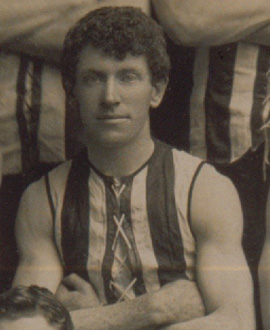One thing you’d have to say about Con McCormack is that he loved to move around – whether on the field or off. And the result was a star that flickered only briefly at Victoria Park, but who ended up making major contributions to two sports in three states.
Con first came to prominence in 1901 when he starred with Northcote and won that club’s end-of-year award for best all-round player. That made him a popular target for VFL clubs (one newspaper described him as a “brilliant junior”), and Collingwood was fortunate to win the race for his services.
He played on the half-back flank mostly in that debut campaign and instantly became a standout player. He went straight into the team for the opening round, was named among the team’s best players in each of his first four games and missed only one match for the entire season. Newspaper reports of the day frequently note him as the pick of Collingwood defenders in different games. So good were his performances that he was chosen for Victoria to play against South Australia late in the season, and he would later be named amongst the Magpies’ best players in their Grand Final victory over Essendon. “In McCormack the club has gained a defender of sterling quality,” noted The Australasian.
He played a particularly important role on Grand Final day. This game is remembered for a vital move when regular star centreman Fred Leach was assigned the job of shadowing Essendon champion Albert Thurgood. He did so remarkably effectively. But the move meant someone had to fill Leach’s spot in the centre, and it was McCormack who stepped up, playing what one journalist described as a “brilliant” game.
McCormack initially failed to reach the same heights in 1903, and actually returned to Northcote for a few weeks. But when star centreman Fred Leach abruptly retired mis-season, McCormack came back and immediately stepped straight into Leach’s formidable boots.
McCormack was just as big and instant a hit as a centreman as he had been as a half-back. He was strong, mobile and loved to run. He was a particularly good kick and reasonable in the air, but the running game was his real strong suit, and he had the ball skills to make the most of it. In 1903 critics praised his “cool and clever work in the centre”, and his performances in the back half of 1903 helped make up for Leach’s absence. As The Leader noted: “McCormack’s splendid centre work has quite supplied the want which was feared would be felt when Fred Leach retired.”
McCormack stepped into the centre position and made it his own with a string of outstanding performances that saw him named among the best centremen of the season. He then capped off a breathtaking season with a near best-on-ground display in the Grand Final as the Pies just scraped home for their second successive flag.
Remarkably, that was Con McCormack’s last game for Collingwood. Early the following year he headed to the cash-rich goldfields of WA, where he played for Mines Rovers. He captained them in 1905, became embroiled in controversy over the appointment of the umpire for the Grand Final, and then was rubbed out for eight games in 1906.
After four seemingly hectic seasons there he returned to Melbourne early in 1908 to captain the Rose of Northcote side. In September of that year he moved to Sydney and had a game with YMCA against Hawkesbury College, and was appointed captain of Newtown the next year. He would remain in Sydney for the rest of his life.
In 1909, the Sydney sporting paper The Referee wrote: “A bright, intelligent young fellow of good physique, McCormack desires to remain in Sydney. Should he do so, he will be a decided acquisition to local football, as he was educated In the best of schools, Collingwood, when at the zenith of its fame, and when its players were delighting football crowds by their skilful and heady football.”
But it wasn’t just Australian football that would benefit from McCormack’s decision to settle in Sydney. Two of his sons, Eric and Jack, would go on to become wonderful rugby league players, Eric with St George and Jack with St George, South Sydney, Canterbury Bankstown and NSW (many reports credited their Aussie Rules background with their outstanding kicking skills). Con himself also became a fine cricketer with the Erskineville club, where he kept wickets.
Con McCormack died in Sydney in 1940, having given much to his adopted state. But even though he was only at Collingwood for two seasons, each of those produced a Premiership. And it’s fair to say that had he stayed at Victoria Park, he might have played in more.
- Michael Roberts


 x2
x2






